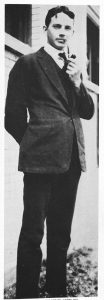
Upon arrival in Chapel Hill, Tom signed up for room and board at the three-story rooming house of Mrs. Mattie Eva Hardee, a widow originally from Asheville–$15 a month for board and $7.50 for a student’s half of a room. Writing to his brother-in-law a few days later, he declared the food “splendid” but the room rent “exorbitant.” His professors were “all fine fellows” for whom he hoped to “do well in all my studies and my guess is that I’ll have to ‘bone’ up on math.”
During the next four years, Wolfe would do well in his studies—as a junior winning the prize in philosophy for best student thesis and earning multiple A’s that same year from favorite professors Edwin Greenlaw in English, Frederick Koch in dramatic literature, and Horace Williams in philosophy. His achievements in student publications and as a leader of campus organizations were equally outstanding—assistant editor, then managing editor, and finally editor-in-chief of the Tar Heel student newspaper; assistant editor, then assistant editor-in-chief of the University Magazine; associate editor of the Yackety Yack yearbook; member of student council; author of and sometimes actor in plays performed by the campus Carolina Playmakers campus theater company; and class poet.
After graduating from UNC in 1920, Wolfe studied playwriting at Harvard, then moved to New York where he initially did some teaching at New York University. But soon he turned his legendary intellectual energy and passion to fiction writing. In 1929 his first novel, Look Homeward, Angel, was published, winning wide praise among literary critics and creating a sensation because of the thinly-veiled autobiographical nature of the book. The life and experiences of the book’s protagonist, Eugene Gant, are often unmistakably similar to those of Thomas Wolfe. In Look Homeward, Angel, however, young Gant attends the state university at Pulpit Hill, not Chapel Hill. But the sense of adventure, excitement, and intellectual stimulation he experienced there as described in Look Homeward, Angel, echo loudly the fond memories of Thomas Wolfe for a place and time he would later describe as being “as close to magic as I’ve ever been.”
